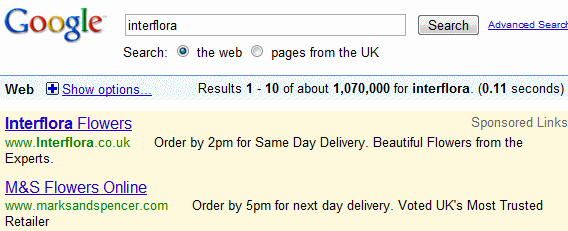
Should you bid on a competitor’s trade mark in AdWords? This is a simple question, but not one that has a simple answer.
The High Court ruled in 2013 that you should not, as doing so would amount to a trade mark infringement.
The case before the court involved Marks & Spencer and Interflora. M&S had made an AdWords bid on the name “Interflora”. Users who searched that name were given results that directed them to M&S’s flower delivery service. Interflora claimed that this was an instance of trade mark infringement. The judge agreed, saying the adverts may lead the average well-informed internet user to think that M&S was a member of Interflora’s network.
M&S appealed, with the result that the case has been referred back to the High Court for retrial. The Court of Appeal said they doubted a significant proportion of internet users would think M&S was part of Interflora. However, as they had not seen all the evidence they could not overrule the court’s decision.
Bidding on a trade mark is not an infringement
It is not bidding on a trade mark itself that puts you at risk of infringement. The question is: does the advert suggest that there is a connection with the owner of the trade mark? Would a reasonable internet user be confused? Factors to consider are the wording of the ad and the page the search results lead to.
With the legal situation up in the air, the best advice is that you can bid on a competitor’s trade mark, but if you do, beware the risk of being sued. If your resources are significantly greater than your competitor’s and you are up for a fight, you may be willing to take that risk. Be wary though.
Google’s position
Google allows you to bid on other people’s trade marks. They do this for one simple reason: it generates revenue. So, you can bid on a competitor’s name and your ad would appear when their name is searched.
What Google won’t let you do is put your competitor’s name in your ad. Their fear is that this will amount to a trade mark infringement. In the Interflora case, M&S bid on the word “Interflora”. The search result showed M&S’s flower delivery service but didn’t mention the word “Interflora”.
Costs
It is expensive to bid on competitors’ trade marks though. That’s because they don’t perform well under Google’s AdWords criteria. Google will reward you if your advert leads to a highly relevant web page. In contrast, it penalises you if your ad does not.
The chances are that you don’t have your competitors’ names on your website. (You would be foolish to do so as you risk a claim for trade mark infringement.) So, your AdWords cost for bidding on your competitors’ trade marks will be high. Worse still, it could impact on the cost of the rest of your AdWords campaign.
Bidding on your own name
Many pay-per-click specialists advise their clients to bid on their own names. There is good reason for this. Say a competitor bids on your name but you don’t. They will build up credibility with Google by generating a good click through rate even though they fall down on relevance. When you then bid on your own name, you will have to pay more to beat them. What’s worse is that their name may appear above yours for a search on your own name.
In some sectors it’s a given that you must bid on your own name. Take a hotel or restaurant that has a commission arrangement with a booking website, such as booking.com or toptable.com, for example. Sites such as these will bid on your name. Although the general rule is that you cannot include someone else’s trade mark in an ad (as we saw above), these businesses can do so. Google permits it as they are your resellers.
But you will want your customers to come to you directly so that you don’t have to pay a commission to the reseller. By bidding on your own name you should be able to ensure that you come above the resellers on the rankings. Google will rank your ad higher because it is more relevant.
Keyword rich names
No discussion of Google searches is complete without mentioning the importance of the name you give your business. A word of warning: names that are keyword rich or descriptive are difficult to protect under trade mark law.
It’s true that descriptive names can help with search engines and online visibility, as we explained in our blog post: Your Brand and your Domain Name.
But what you gain in search engine visibility is more than lost in the difficulty you will find in protecting your name.
We advise start-up businesses not to choose descriptive names. There are other ways in which you can increase your visibility with search engines.
Conclusion
It is worth thinking about bidding on your competitors’ trade marks but beware of the risks involved if you do so.
Also, examine whether you should be bidding on your own name.
As ever with trade marks, it’s worth taking advice with specialist lawyers before you commit to your next AdWords campaign.
Shireen Smith is an intellectual property lawyer and published author of Legally Branded, a book which seeks to make intellectual property and internet law more accessible. She founded Azrights Solicitors in 2005, with the aim of making IP easy to access.
Email shireen@azrights.com. Twitter @ShireenSmith.

Excellent summary of the position and a much asked question in my world